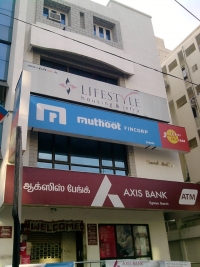“Financial inclusion”, “banking the unbanked”, blah blah blah.
Call them what you want. But they all mean the following:
Financial Inclusion / Banking the Unbanked – What They Mean
People want to borrow money only from banks; people want to deposit their savings only in banks. But, since they can’t access a bank, they’re forced to turn to loan sharks and blade companies. To protect people from getting ripped off by these undesirable elements of the society, banks should spread out all over the country so that the common man can easily find a bank at every corner. Technology is the answer.
IMO, this narrative and the underlying premise are both flawed.
This became evident when I recently visited several small towns in Tamilnadu and Andhra Pradesh, two states in South India. Virtually every high street I saw was lined with banks, ATMs, Western Union agents, pawn shops and gold loan companies.
In short, I found all kinds of financial service providers coexisting peacefully with one another wherever I went. Which raises the obvious question:
Why do people patronize informal financial services when they can go to banks?
I’ll answer this question by paraphrasing Aite Group analyst Ron Shevlin’s post The Debanked Are For Real:
People have access to banks for loans and deposits. But they still go to loan sharks and blade companies. Not because they have to. Not because they are underserved. But because they want to.
They want to go to loan sharks and blade companies because these unsavory players in the informal financial services sector deliver two of the most powerful triggers of consumer action ever invented: Speed and Greed (yes, they deserve to be capitalized!).
Let’s see how.
First take loans.
People enter a pawn broker or gold loan shop, pledge their belongings and walk out with cash. No credit check, no KYC, no empty promises of “we’ll get back to you in 7 working days”. No nothing. Just. Hard. Cash. So, the informal financial sector delivers speed. And, this is not restricted to India. According to this Boston Globe article, “Pawnbroking has been part of Western civilization at least since ancient Rome”.
Then take deposits.
Why do people trust their savings to a blade company when they can park their surplus cash in a bank account? For the uninitiated, “blade company” refers to fly-by-night operators that – ahem – fly below the regulatory radar and offer interest rates that are 200-300 bps higher than that given by banks on fixed deposits. They justify these inflated interest rates – that is, to those who even bother to seek justification – by saying that they’d invest the money in eucalyptus tree plantations, emu bird farming and other “rapid surefire routes to riches”.
Recent history is full of blade companies – from Abhinav Plantation in the mid 1990s to Sarda Group last year – that have gone bust in highly publicized flameouts, leaving their depositors high and dry. Despite their abominable track record, the next blade company is just around the corner. Why? Because they stoke consumers’ greed – and greed never goes out of fashion. The Bernie Madoff Ponzi scheme in the USA shows that blade companies aren’t confined to third world countries or only prey on illiterate people.
Can banks use technology to match the informal financial sector in delivering speed and greed?
As a technology marketer, I’m always tempted to grab every opportunity to position IT as the solution for everything. But, in this case, I’ll desist from doing so because it’s downright false.
As regulated entities, banks are subject to stringent norms regarding asset quality and capital adequacy. As a result, they can’t lend to every Tom, Dick and Harry. Technology can help banks collect and process loan applications faster and cheaper but not necessarily approve more loans. Under the present regulatory framework, banks’ risk management policies will reject many loan applications equally fast. Hello next door pawn shop if you’re in a hurry for a loan. (Not surprisingly, according to the aforementioned Boston Globe article, pawn broking actually grew by 9% between 2012 and 2013).
The GFC has curbed the banking industry’s ability and / or appetite to invest in risky assets in the pursuit of higher returns. Technology can help banks to garner deposits from a wider audience but it can’t ensure that they’re able to offer higher interest rates. In the absence of that, banks will remain unattractive to greedy depositors. Hello next door blade company if you’re seeking alpha returns.
Ergo, even if technology-mediated financial inclusion spreads far and wide, the informal financial services sector won’t be driven away anytime soon.
Which is not be such a bad thing, seeing as how the common man seems to be happy to patronize both of them side by side – or, one on top of the other, as I noticed on one occasion!
UPDATE DATED 25 JANUARY 2019:
Since I wrote the original post, two key developments have taken place, one each on the lending and deposit side.
- Lending Fintechs: There are dozens of lending fintechs. None of them has a banking license. Some of them have an NBFC license and lend on their own books whereas others merely aggregate loans that are eventually serviced by banks. While they deliver speed, it’s questionable whether they will offer loans to people who typically don’t qualify for bank loans and go to pawnbrokers. Besides, many of them charge usurious interest rates, so they’re more like tech-mediated pawnbrokers.
- Payment Banks: These are banks that can only take deposits. They’re regulated, so I doubt if they can pander to greed by offering the kind of interest rates that blade companies offer. According to news reports, they have flopped. More on that in a separate blog post.
Lending Fintechs and Payment Banks were supposed to spread financial inclusion but the informal financial services sector is still thriving. If it was emu bird farming in the past, it’s crypto or whatever shiny new asset class now. In short, while the instruments have changed, speed and greed are evergreen.
UPDATE DATED 3 NOVEMBER 2021:
People. Please don't just give money to an unknown/unregulated entity on claims of returns. Pliss to give ijjat to your hard earned money.
Claims of 4% a week, I heard. When fixed deposits are 4% a year. Please be utterly careful.
— Deepak Shenoy (@deepakshenoy) November 2, 2021
Enough said!


